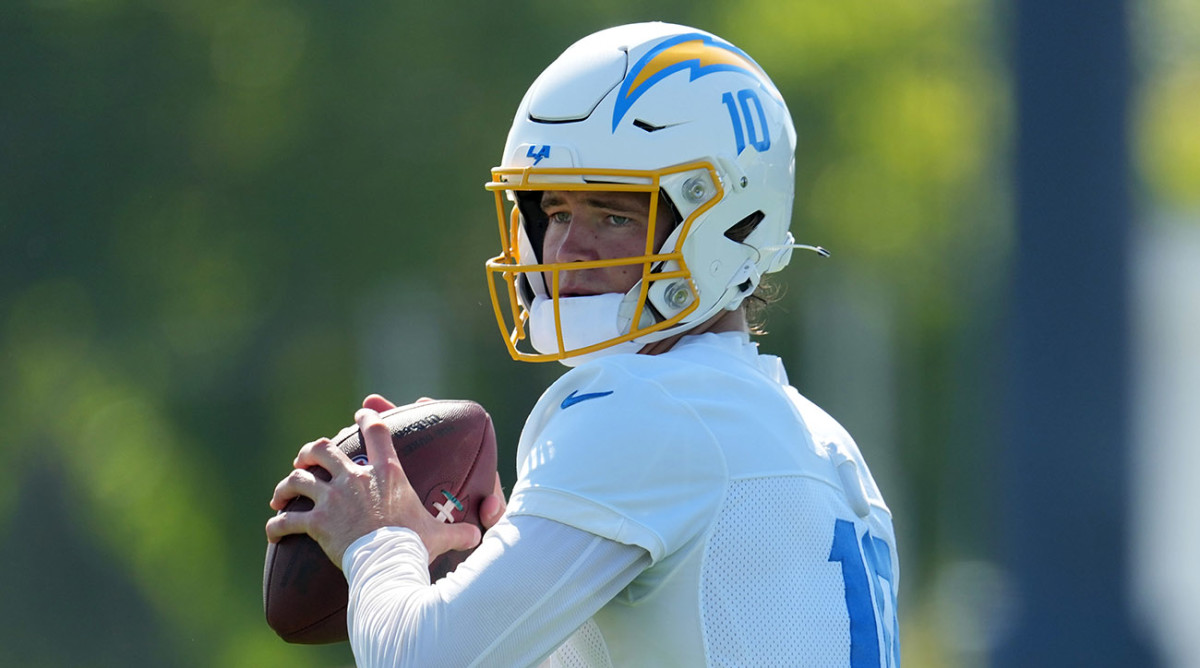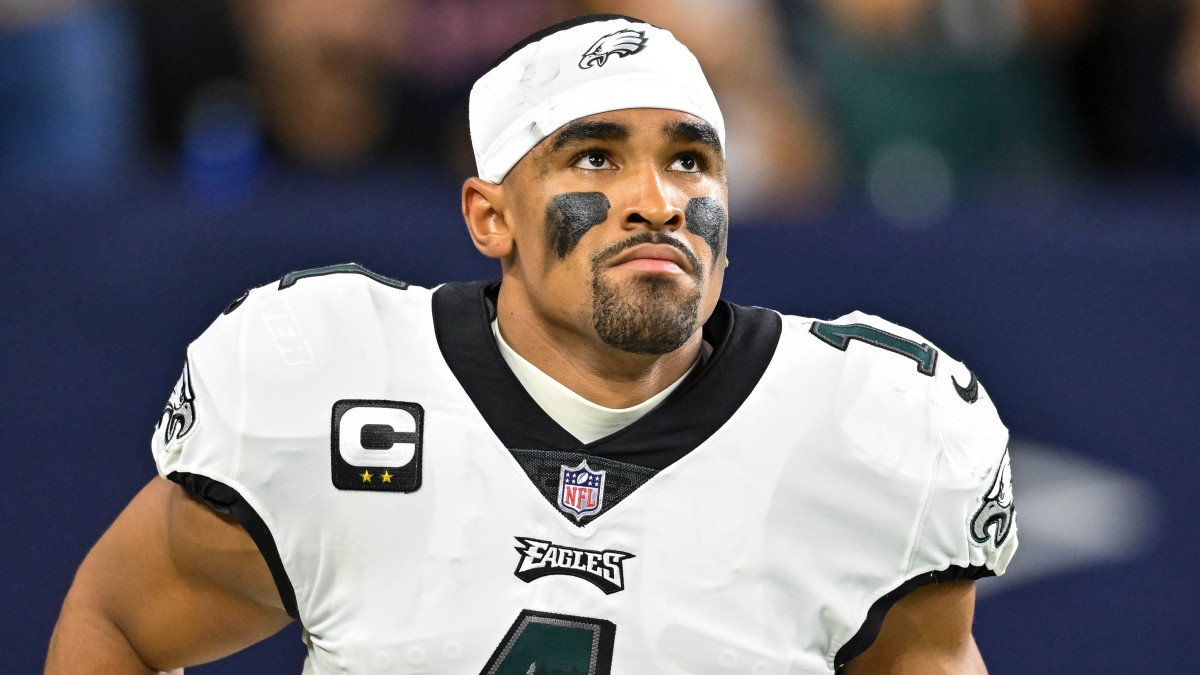Fantasy Football 2023: Tracking Which Quarterbacks Target Their Running Backs the Most
The quarterback position is the most important in the world of professional football. He has the ball in his hand on the majority of offensive snaps, and his knowledge, skill set and decision-making ultimately determine how an offense will perform. That also means he’s integral in the production of points for our fantasy teams.
As a result, it makes sense for us to know his tendencies.
What position does he target most in the pass attack? Does he take chances downfield? The answers are important to his draft value and to the value of the players around him. So let’s look at which field generals targeted certain offensive weapons – broken down by position – the most and the least last season.
In the first of a three-part series, we’ll start off with the running backs.
Note: Quarterbacks in this research started a minimum of 10 games last season.

Running Backs – Most Targets
1. Justin Herbert, Chargers (24.7%): Herbert led all quarterbacks in passes to his running backs, which is no surprise since Austin Ekeler had 107 catches. He was also 27th in aDOT (average depth of target), which is a surprise when you consider his big arm. With new offensive coordinator Kellen Moore at the helm and all of his wideouts at 100% (plus the addition of Quentin Johnston), I think this will change. In fact, I’d expect Herbert to take more chances downfield this season.
T-2. Russell Wilson, Broncos (24%): Wilson is coming off a dreadful season, but can he turn things around with coach Sean Payton at the helm? Payton was a big fan of throwing the ball to his running backs in New Orleans, but he also had Alvin Kamara at his disposal. Still, this should be considered a good thing for the duo of Javonte Williams and Samaje Perine in terms of their target share.
T-2. Davis Mills, Texans (24%): Mills is obviously not going to be under center for the Texans this season, as the team drafted C.J. Stroud second overall. It’s tough to gauge if this trend of targeting backs will remain under new offensive coordinator Bobby Slowik, since he’s never been in this position. Still, Dameon Pierce and Devin Singletary should help the young quarterback as pass catchers.
4. Andy Dalton, Saints (23%): Dalton is now a backup in Carolina, but it’s notable that running backs were targeted 23% of the time in New Orleans. Pete Carmichael is still the offensive coordinator, and Kamara will remain a popular target for the new starter, Derek Carr. If you’re wondering, he targeted running backs 19.1% of the time in what would be his final season as a member of the Raiders.
5. Mac Jones, Patriots (22.2%): Jones, who played without an actual offensive coordinator last season, was fifth in targets to backs. That was huge for the value of Rhamondre Stevenson, who had 88 targets and 69 catches. New coordinator Bill O’Brien liked to target backs in Houston (remember Arian Foster?), and there’s no superior competition for Stevenson in terms of targets in this backfield.
6. Daniel Jones, Giants (22%)
7. Joe Burrow, Bengals (21.9%)
8. Aaron Rodgers, Packers (20.7%)
9. Jimmy Garoppolo, 49ers (20.5%)
10. Ryan Tannehill, Titans (20.3%)

Running Backs – Least Targets
1. Jalen Hurts, Eagles (11.5%): Hurts emerged as one of the truly elite fantasy quarterbacks in the league, but he did it without targeting his backs much. In fact, Kenneth Gainwell led all Eagles runners with just 23 catches last season. That doesn’t bode too well for D’Andre Swift making a massive PPR impact in his first season in Philadelphia. Gainwell remains on the roster, too.
2. Kirk Cousins, Vikings (12.9%): The Vikings ran the fifth-most plays out of “11 personnel” (one running back, one tight end) and that equated to 643 pass attempts. However, just 88 of those attempts went to backs. Dalvin Cook, now a free agent, led the team with 39 catches. That might be around the ceiling for new starter Alexander Mattison, who is a good receiver but won’t have a boatload of pass-catching chances.
3. Marcus Mariota, Falcons (13%): Mariota is gone, but this is the same system in Atlanta. Regardless, the Falcons have a young quarterback in Desmond Ridder at the helm and now field a potential backfield superstar in Bijan Robinson. As a result of the change of personnel, I’m not looking at this stat as a real concern because of the value of Robinson, a great receiver.
4. Trevor Lawrence, Jaguars (13.4%): Lawrence was much better in his second NFL season compared to his rookie campaign, but he still didn’t throw the ball to his backs a ton. In fact, Travis Etienne led the backfield with just 45 targets. With Calvin Ridley now in the pass attack, this doesn’t seem to be a trend that’s going to change much. I’d expect a 30- to 40-reception ceiling for Etienne this season.
5. Lamar Jackson, Ravens (14.1%): Jackson ranked eighth among quarterbacks in aDOT, so it’s no surprise he didn’t throw to his backs a ton. They were also dead last in the league in 11 personnel, and that’s going to change under new offensive coordinator Todd Monken. After all, the team added Odell Beckham Jr., Zay Flowers and Nelson Agholor in the pass attack. As a result, I wouldn’t be expecting any of the Ravens runners to make a massive impact in the passing game.
6. Geno Smith, Seahawks (14.7%)
7. Jacoby Brissett, Browns (15.2%)
8. Dak Prescott, Cowboys (15.5%)
9. Justin Fields, Bears (16.7%)
10. Patrick Mahomes, Chiefs (17.3%)
